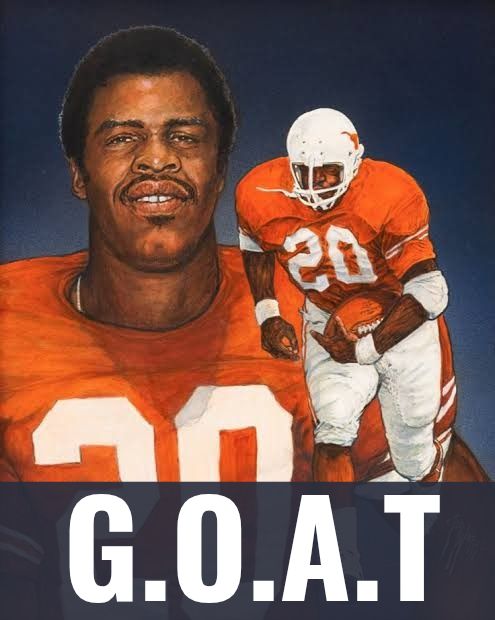
Earl Campbell Named the Greatest College Football Player of All Time
In a groundbreaking announcement by ESPN, Texas Longhorns legend Earl Campbell has been crowned the Greatest of All Time (GOAT) in college football. This honor comes after a heated competition with some of the sport’s most iconic names, including Herschel Walker of Georgia, Tim Tebow of the Florida Gators, and Archie Griffin of Ohio State. The title of “Greatest of All Time” is not just a reflection of Campbell’s incredible individual talent, but also a testament to his lasting impact on the sport, the university he represented, and the college football landscape as a whole.
This prestigious recognition cements Campbell’s legacy as one of the most dominant forces in college football history, a player whose athleticism, power, and charisma made him a household name not only in Texas but across the nation.
Earl Campbell’s rise to prominence in college football began in the mid-1970s when he joined the Texas Longhorns football program. Born in Tyler, Texas, in 1955, Campbell was raised in a football-centric environment where sports were a vital part of community life. His decision to play for the Longhorns was one of the most pivotal moments in college football history, as Campbell’s exceptional talent would soon help catapult the program to new heights.
Campbell’s journey to greatness began in 1974 when he burst onto the college football scene as a freshman. His power running style was apparent even early in his career, and it quickly became clear that Campbell was destined for stardom. In just his first season, Campbell rushed for 928 yards and seven touchdowns, earning himself the Southwest Conference Freshman of the Year honors.
But it was in the years that followed when Campbell truly began to make his mark. In his sophomore season, Campbell broke the school’s single-game rushing record, rushing for 262 yards against Texas Tech. This performance was just a glimpse of what was to come.
In 1977, Campbell had a breakout year that would make him a household name in college football. That year, he rushed for 1,744 yards and 19 touchdowns, leading Texas to a 10-1 record and a berth in the Cotton Bowl. He dominated the competition week in and week out, displaying a rare combination of speed, strength, and vision that was unparalleled at the time. His ability to break tackles, overpower defenders, and sprint past would-be tacklers made him nearly unstoppable.
Campbell’s 1977 season was capped off by one of the greatest individual honors in all of sports: the Heisman Trophy. He became the first Texas Longhorn to win the prestigious award, a testament to his dominance on the field. He was awarded the Heisman after receiving 214 out of 399 first-place votes, easily outpacing second-place finisher, quarterback Ricky Bell of USC. His remarkable season included a memorable performance against the Texas A&M Aggies, where Campbell rushed for 118 yards and three touchdowns in a dominant victory.
For Campbell, winning the Heisman was the culmination of years of hard work, sacrifice, and determination. But it was also a reminder of the larger significance of his role in college football. He wasn’t just a star player; he was a symbol of pride for the University of Texas and the city of Austin, Texas. Fans lined the streets to celebrate his achievements, and Campbell became a cultural icon, not just for his ability on the field but for his character and humility off it.
Campbell’s contributions to Texas football go far beyond the statistics he amassed on the field. His leadership helped restore the Longhorns to prominence, and his legacy as a Longhorn is revered to this day. Texas football had been through a period of stagnation before Campbell arrived, but his arrival signaled the beginning of a new era.
Campbell’s influence also extended beyond the University of Texas. He became a hero not just to Longhorn fans, but to football fans all across Texas. His style of play—an aggressive, no-nonsense approach—resonated with the people of the state, who pride themselves on their love for hard-hitting, physical football. Campbell’s toughness embodied everything Texas football stood for, and he became a role model for young athletes in the Lone Star State.
His time at Texas coincided with a golden era of college football in the Southwest Conference, and Campbell was undoubtedly one of the brightest stars of that period. However, it wasn’t just his play on the field that made him beloved in Texas; it was his character, humility, and work ethic. Campbell’s modest nature and blue-collar mentality endeared him to fans who appreciated not only his talent but also his genuine persona.
While Campbell’s achievements in college football are unparalleled, the debate about who truly deserves the title of “Greatest of All Time” is one that has fueled passionate arguments among fans and analysts for decades. Other names that have been frequently mentioned in this debate include Herschel Walker, Tim Tebow, and Archie Griffin.
Herschel Walker, the Georgia Bulldog legend, had a similarly illustrious college career. Known for his blend of speed, power, and durability, Walker dominated college football in the early 1980s. He won the Heisman Trophy in 1982 after rushing for 1,752 yards and 16 touchdowns and led the Bulldogs to a national championship in 1980. Walker’s 5,259 career rushing yards and 49 career touchdowns remain among the best in college football history. His name is often brought up in discussions about the greatest running backs to ever play the game, and his legacy in Georgia and college football is undeniable.
Tim Tebow is another player who has been mentioned in GOAT discussions. The Florida Gators quarterback, known for his unique combination of size, athleticism, and leadership, was a force during his college career. Tebow won two national championships with Florida and became the first sophomore to win the Heisman Trophy in 2007. Tebow’s ability to take over games with his arm, his legs, and his leadership made him a standout, and his career numbers remain some of the best in SEC history.
Finally, Archie Griffin, the only two-time Heisman Trophy winner in college football history, also belongs in the conversation. Griffin played for the Ohio State Buckeyes in the 1970s and remains the gold standard for running backs in college football. His two Heisman wins came in back-to-back years (1974 and 1975), and his college career was marked by consistent excellence. Griffin rushed for over 1,500 yards in each of his final two seasons, and his 5,589 career rushing yards was a record at the time.
Each of these players brought something unique to the table, but ultimately, Earl Campbell’s combination of individual achievements, team success, and impact on college football set him apart. His ability to dominate at the running back position, his role in Texas’ rise to prominence, and his iconic Heisman win in 1977 make him the greatest college football player of all time, according to ESPN’s ranking.
Beyond his on-field success, Earl Campbell’s impact on college football extends into the cultural fabric of the sport. His style of play—brutal, aggressive, and relentless—changed the way running backs were viewed in college football. While many players in the 1970s used speed and finesse to break long runs, Campbell relied on his strength and willpower to wear down defenses. His success helped revolutionize the way teams approached the running back position, and he was one of the first players to highlight the importance of a powerful, downhill running style in a college football world increasingly dominated by pass-heavy offenses.
Additionally, Campbell’s legacy has transcended the college ranks. After his illustrious college career, Campbell went on to have a successful NFL career with the Houston Oilers, where he became a Pro Bowl running back and earned the nickname “The Tyler Rose.” His impact was felt not just in college football but across the entire sport.
Off the field, Campbell has also made significant contributions to the Texas community, using his platform to support various charitable causes and give back to the state that embraced him as one of their own.
Earl Campbell’s selection as the Greatest of All Time in College Football is a well-deserved recognition of his contributions to the sport. While the debate about who holds the top spot in college football’s history will continue, Campbell’s dominance on the field, his legacy at the University of Texas, and his lasting impact on the sport solidify his place as a true legend.
With his name now forever etched into college football history, Earl Campbell has taken his rightful place among the greatest to ever play the game. His achievement not only cements his own legacy but also serves as a reminder of the power of hard work, passion, and dedication—qualities that made him a hero to millions of fans, both in Texas and across the country.





